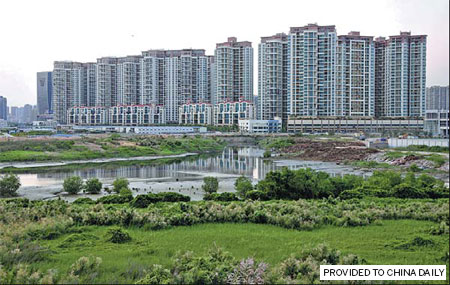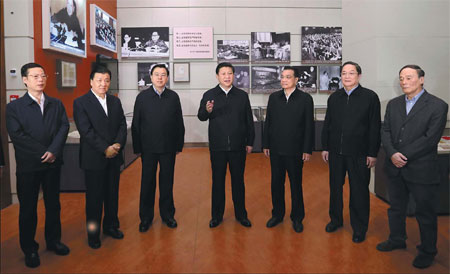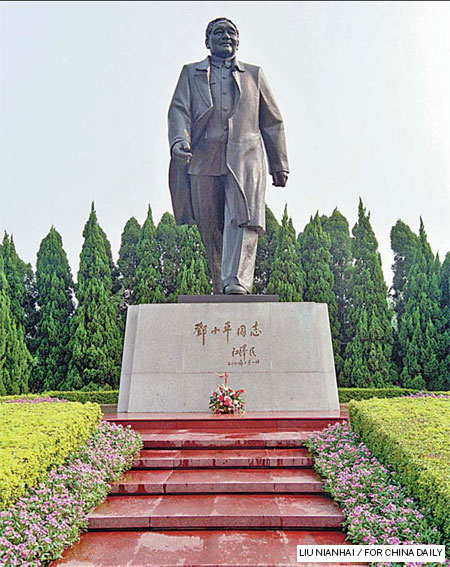Man of the people makes little fuss on first official visit
Updated: 2012-12-10 07:54
By Tang Yue, He Na and Yang Wanli (China Daily)
|
||||||||
|
Xi Jinping (center), general secretary of the Communist Party of China Central Committee and the members of the Political Bureau of the CPC Central Committee, at "The Road Toward Renewal" exhibition in Beijing in November. Lan Hongguang / Xinhua |
|
Above: The statue of Deng Xiaoping on Lianhua Hill in Shenzhen. Below: Newly built apartment blocks in the Qianhai Experimental Zone. |

Xi Jinping's arrival in Shenzhen was deliberately low-key, report Tang Yue, He Na and Yang Wanli.
When Xi Jinping started a two-day inspection tour in Shenzhen, Guangdong province, on Friday, it was no surprise that the trip attracted huge media attention.
After all, it was the first time that the new general secretary of the Communist Party of China Central Committee had traveled outside Beijing since he assumed the post in November.
While Xi visited the Qianhai experimental zone and a couple of businesses on Friday, he spent time on Saturday laying flowers at a bronze statue of the late leader Deng Xiaoping on Lianhua Hill.
However, rather than who he met or what he said, it was the manner in which the new Party chief arrived that caught the overwhelming attention of the media: no welcoming crowds or banners, no red carpet, no heavy traffic control. The police did block a couple of main roads as Xi's small motorcade passed by, but only briefly.
"The roads in the Qianhai experimental zone were just as normal. A motorcade of eight cars arrived at about 3:30 in the afternoon, but not a single welcome banner was seen and neither were the usual cheering crowds," according to a report on Hong Kong's Phoenix Television.
China's new leader was living up to a promise he'd made three days earlier.
Xi presided over a meeting of the Political Bureau of the CPC Central Committee, China's top ruling body, on Tuesday when a document was adopted that detailed explicit measures to fight strict formality and bureaucracy. The measures included a reduction in the number of meetings, making policy documents more concise, lessening traffic controls during officials' visits and exercising thrift.
There should be "no welcome banners, no red carpets, no floral arrangements or grand receptions for officials' visits", according to the statement.
It also banned members of the Political Bureau from publishing monographs and signing autographs.
Moreover, members of the Political Bureau of the CPC Central Committee, are now required to "adhere to the regulations before asking others to do so and not to do anything they wouldn't want others to do", continued the statement.
It was noticeable that at a recent meeting, two members of the Standing Committee of the Political Bureau, Li Keqiang and Wang Qishan, broke away from the usual verbose but hollow style. They asked the officials and scholars to dispense with their prepared speeches and enter straight into discussion.
"Why were the receptions always so extravagant? They were trying to flatter the superior leaders. But if extravagance and reliance on exaggerated formality are seen as lacking in merit, they will die out," said Zhen Xiaoying, former vice-president of the Central Institute of Socialism.
"In China, it is very important for the central leadership to set an example because it sends a strong signal to officials at the lower levels," said Ma Huaide, a law professor at China University of Political Science and Law.
The public, especially those with bitter experience of the prevailing formality and bureaucracy, are keen to see the changes implemented as quickly as possible.
Hu Bensheng said he was often delayed by the heavy traffic and police presence when he worked in Changchun, the capital of Jilin province in Northeast China.
To make way for a long line of black sedans, the police always used a bullhorn and shouted "get out of the way" and "stand clear", he recalled.
"What made me even angrier was that on one occasion the road was closed about 30 minutes before the motorcade actually passed by, but none of the officials or departments had bothered to inform people of the closure in advance," said the 37-year-old sales manager.
"It was a winter morning, it was -20 C outside. I was in my car with the air-conditioning on, but many passers-by, those riding bikes, those on foot, students, everybody had to wait in the cold," said Hu.
Meanwhile, when his friends travelled from Southwest China's Sichuan province to Jilin's Changbai Mountain on a sightseeing trip last year, they were told at the gate that entry was forbidden and that they would have to return the next day. The staff said safety concerns about a high-ranking official on a tour of inspection had prompted the closure.
"They were very angry and gave up on their plan. They said they would never come again," said Hu.
He said he was happy to hear about the changes imposed by the new central government and believed that the measures were intended to improve the relationship between officials and ordinary citizens.
"It's really time to cancel the privileges enjoyed by officials or else their relationships with the common people will grow more distant," he said.
Feudal thought
The new style may not seem a weighty issue at first glance, but all these outmoded practices have shaped the image of the Party and the government and decided the fate of the Party to certain extent, Zhen noted.
During the Chinese civil war, the Party's relationship with the people was much closer. The CPC has been the ruling party for more than 60 years and formality and bureaucracy have grown within it, thus estranging many officials from the public, she said.
"In theory, there is a likelihood that any ruling party can lose power. To avoid that possibility becoming a reality, the Party should win the trust and support of the people. And this is absolutely a good move," Zhen said.
The change is also much needed, as the Party is being transformed into a more modern and democratic body, she added
"The extravagant receptions and road closures are de facto privileges; the autographs and collected published works have a lot to do with the cult of personality," she said.
"Both can be seen as remnants of feudal thought, which has such a long history in China and takes a long time to eradicate."
The CPC rejected overt formality and bureaucracy long ago. In 1942, Chairman Mao Zedong initiated the Rectification - or zhengfeng - Movement, within the Party, focusing on political and ideological self-education for ideological reconstruction.
The movement required Party officials to reject the rigid, stereotypical writing style and to adopt a fresh method to better promote revolutionary development.
Decades later, however, officials continue to deliver seemingly endless speeches at formal meetings and ceremonies.
"If you read official speeches, government work reports, the minutes of meetings and reports in some newspapers, you see a lot of cliches," said Bi Yantao, director of the Center for Communication Studies at Hainan University.
"People brag about their determination and high moral sense, but that is not necessarily how they behave," he said.
"I don't believe anyone really enjoys reading this stuff. But it is an example set by the government and everyone in society, including teachers and students, is influenced by it."
In 2010, Xi emphasized the need for officials to improve their methods of speaking and writing and to make their documents and speeches concise, concrete and fresh. He also advocated independent thought in the Party and a more relaxed environment that would allow officials to speak in a more straightforward manner.
Having previously highlighted these problems, Xi recently sent out a warning to Party members: "Empty talk leads a country astray, while hard work will make it thrive", he said during a visit to an exhibition on China's travails on the path to national revival.
Image enhancement
"As always, the new leaders have sent out a strong signal of their leadership and working style upon taking office. It will help them to build a good image and is good branding," Bi said.
"It is a really positive note that the new central leadership is facing these issues directly. But the long-term effects still remain to be seen. It requires more specific regulation at all levels, as well as monitoring from the public."
The punishments for violating the rules should also be on public record to insure full compliance, said Zhen.
Public opinion seems to concur.
"The release of the new measures didn't surprise me. As the old proverb says, 'A new broom sweeps cleaner'," said Fu Rao, who works for a multinational company in Dalian, Liaoning province.
Even newly promoted leaders at lower levels or student monitors take some action to display their abilities - so should the new central government, she said.
"I will keep an eye on official changes from now on to see whether the local officials are following the new rules closely."
Zhang Yuchen contributed to this story.
Contact the reporters at tangyue@chinadaily.com.cn and hena@chinadaily.com.cn
(China Daily 12/10/2012 page6)

 Relief reaches isolated village
Relief reaches isolated village
 Rainfall poses new threats to quake-hit region
Rainfall poses new threats to quake-hit region
 Funerals begin for Boston bombing victims
Funerals begin for Boston bombing victims
 Quake takeaway from China's Air Force
Quake takeaway from China's Air Force
 Obama celebrates young inventors at science fair
Obama celebrates young inventors at science fair
 Earth Day marked around the world
Earth Day marked around the world
 Volunteer team helping students find sense of normalcy
Volunteer team helping students find sense of normalcy
 Ethnic groups quick to join rescue efforts
Ethnic groups quick to join rescue efforts
Most Viewed
Editor's Picks

|

|

|

|

|

|
Today's Top News
Health new priority for quake zone
Xi meets US top military officer
Japan's boats driven out of Diaoyu
China mulls online shopping legislation
Bird flu death toll rises to 22
Putin appoints new ambassador to China
Japanese ships blocked from Diaoyu Islands
Inspired by Guan, more Chinese pick up golf
US Weekly

|

|









